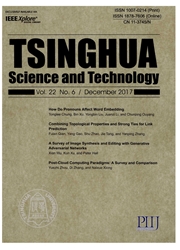

 中文摘要:
中文摘要:
The energy consumption in large-scale data centers is attracting more and more attention today with the increasing data center energy costs making the enhanced performance very expensive. This is becoming a bottleneck to further developments in terms of both scale and performance of cloud computing. Thus, the reduction of the energy consumption by data centers is becoming a key research topic in green IT and green computing. The web servers providing cloud service computing run at various speeds for different scenarios. By shifting among these states using speed scaling, the energy consumption is proportional to the workload, which is termed energy-proportionality. This study uses stochastic service decision nets to investigate energy-efficient speed scaling on web servers. This model combines stochastic Petri nets with Markov decision process models. This enables the model to dynamically optimize the speed scaling strategy and make performance evaluations. The model is graphical and intuitive enough to characterize complicated system behavior and decisions. The model is service-oriented using the typical service patterns to reduce the complex model to a simple model with a smaller state space. Performance and reward equivalent analyse substantially reduces the system behavior sub-net. The model gives the optimal strategy and evaluates performance and energy metrics more concisely.
 英文摘要:
英文摘要:
The energy consumption in large-scale data centers is attracting more and more attention today with the increasing data center energy costs making the enhanced performance very expensive. This is becoming a bottleneck to further developments in terms of both scale and performance of cloud computing. Thus, the reduction of the energy consumption by data centers is becoming a key research topic in green IT and green computing. The web servers providing cloud service computing run at various speeds for different scenarios. By shifting among these states using speed scaling, the energy consumption is proportional to the workload, which is termed energy-proportionality. This study uses stochastic service decision nets to investigate energy-efficient speed scaling on web servers. This model combines stochastic Petri nets with Markov decision process models. This enables the model to dynamically optimize the speed scaling strategy and make performance evaluations. The model is graphical and intuitive enough to characterize complicated system behavior and decisions. The model is service-oriented using the typical service patterns to reduce the complex model to a simple model with a smaller state space. Performance and reward equivalent analyse substantially reduces the system behavior sub-net. The model gives the optimal strategy and evaluates performance and energy metrics more concisely.
 同期刊论文项目
同期刊论文项目
 同项目期刊论文
同项目期刊论文
 Quality of Experience Assessment for Cross-layer Optimization of Video Streaming over Wireless Netwo
Quality of Experience Assessment for Cross-layer Optimization of Video Streaming over Wireless Netwo A Distributed Fault/Intrusion-Tolerant Sensor Data Storage Scheme Based on Network Coding and Homomo
A Distributed Fault/Intrusion-Tolerant Sensor Data Storage Scheme Based on Network Coding and Homomo Multi-use unidirectional identity-based proxy re-encryption from hierarchical identity-based encrypt
Multi-use unidirectional identity-based proxy re-encryption from hierarchical identity-based encrypt Managing performance and power consumption tradeoff for multiple heterogeneous servers in cloud comp
Managing performance and power consumption tradeoff for multiple heterogeneous servers in cloud comp Probabilistic bounds on the length of a longest edge in Delaunay graphs of random points in d-dimens
Probabilistic bounds on the length of a longest edge in Delaunay graphs of random points in d-dimens 期刊信息
期刊信息
